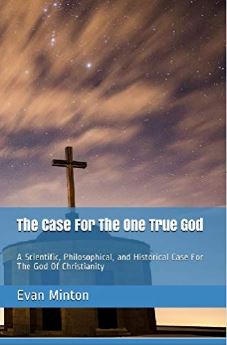I wrote a blog post a couple of years ago titled “The Maximally Great Argument For Arminianism” which attempted to show that God’s universal salvific will logically flows out of Perfect Being Theology. The argument was formulated on my part out of frustration to convince Calvinists that God loves all people, wants all people to be saved, and desires salvation for all people. It doesn’t matter how many passages you point to that assert this in plain English (and plain Greek for that matter), they will find a way to twist them all to mean something other than what any objective interpreter would take them to mean. so John 3:16 says “For God so loved the world that He gave his only son so that whosoever believes in Him will not perish but have everlasting life” is taken to mean that God loves the “world of the elect” and whoever of the elect believes will have eternal life. 1 Timothy 2:4 which says “God wants all people to be saved and to come to a knowledge of the truth” is taken to mean that God wants all different types of people to be saved (some Jews and some Gentiles, some Americans, some Israelis, some of the Chinese, some of the Japanese, and so on). Now, there are biblical passages where reducing “world” to “world of the elect” and “all people” to “all kinds of people” won’t work, and I talked about these in my blog post “5 Biblical Texts That Calvinists Can’t Wiggle Out Of”. Alas, the post was poorly named as bloggers such as Tony Lee Ross Jr. and Kevin Courter have shown that if you try hard enough, you can even manage to get out of these. See here, here, here, and here.
After two years of the article being up, I’m finally having Calvinists interact with it. This is great! I want Calvinists to scrutinize this argument so I can either be shown that it’s not good and shouldn’t be used, or I’ll be convinced that it can withstand scrutiny and i’ll be more confident in using it more often. Among these recent responses was an article by Ed Dingess of Reformed Reasons. If you haven’t been following this written debate, read the articles in this order:
1: “A Maximally Great Argument For Arminianism” by Evan Minton
2: “The Maximally Great Argument For Arminianism Refuted” by Ed Dingess
3: “Ed Dingess Responds To The Maximally Great Argument For Calvinism” by Evan Minton
4: “The Maximally Great Argument for Arminianism: Evan Minton Responds (Sort of)” by Ed Dingess
The content contained in that 4th article is what I’ll be responding to here in this blog post.
Ed Dingess On Perfect Being Theology
Mr. Dingess wrote
“Evan’s first criticism of me concerns ‘Perfect Being Theology.’ A subject that I really didn’t address because I view it as an unnecessary distraction.”1
I find it quite odd that Dingess considers Perfect Being Theology an “unnecessary distraction” considering the entire argument is founded on Perfect Being Theology. This would be like an atheist saying “Evan’s first criticism of me concerns ‘the law of causality’. A subject that I really didn’t address because I view it as an unnecessary distraction.” when trying to give a refutation of The Kalam Cosmological Argument. Given that the law of causality is an essential premise, it would behoove a critic of it to have a good understanding of it. It certainly wouldn’t be a distraction. The same is true of Perfect Being Theology’s relevance to The Maximally Great Argument Against Calvinism.
Dingess Doubles Down On The Objection That The Ontological Argument Is Circular
Ed Dingess wrote
“So, what is my point of contention with the use of Anselm’s argument in Minton’s “maximally great argument for Arminianism?” It is simple. Anselm’s argument fails for the reason I said it did. Since human beings are created in God’s image, they already know such a being exists. What modern classical apologists do is “pretend” that people don’t know and then they take these traits that we already know belong to God and employ them to prove God. It is a vicious circle. How could you ever invent the criteria for the maximally greatest being if in fact you really had no idea coming into the discussion? The idea and criteria are already established and the ONLY way they can be established is if we already know or have some sense of this being. In addition, the argument fails to prove that this being is the God claimed to exist in the Christian religion. This means that any argument formulated in support of Arminianism that is based off The Ontological Argument is highly suspect.2
Obviously, Ed Dingess and I approach apologetics differently. He’s a presuppositionalist and I’m a classicalist and an evidentialist.3 I’m not going to spend a large amount of space criticizing that apologetic approach because regardless of whether or not it’s true that people already (innately) know God exists or not, that has no bearing on whether an argument for God’s existence is sound (i.e is logically valid, has true premises, and has good reasons to affirm the premises). All I’ll say is that presuppositionalism has one major flaw: They conflate the order of knowing with the order of being. I would agree with the presup crowd that God must exist in order for objective morality to exist, the universe to exist, our reasoning faculties to be trustworthy, etc. However, it doesn’t follow that because one knows that objective moral values and duties exist, that we have the ability to be rational, etc. that they also know God exists. Indeed, most people haven’t thought very deeply about what grounds moral facts or whether naturalism entails determinism which entails we can’t trust our own reasoning. Just because X can’t exist unless God exists, that doesn’t mean that because you know X, you know that God exists. God is first in the order of being, but not first in the order of knowing. He’s first ontologically, but not epistemologically. That’s all I will say about my misgivings about the presup method.
But is The Ontological Argument circular? Dingess thinks it is, for he wrote “How could you ever invent the criteria for the maximally greatest being if in fact you really had no idea coming into the discussion? The idea and criteria are already established and the ONLY way they can be established is if we already know or have some sense of this being.”
Again, he simply doesn’t understand how The Ontological Argument works. We don’t “invent criteria” for the maximally great being. We begin with the question “What are great-making properties?” and as I said in the previous response to Dingess, great-making properties are properties that, if possessed by an individual, would make that being greater than he or she would be if they had not possessed them. We then can conceptualize a being who has all of the great-making properties that there are, and this being has these great-making properties to the greatest extent metaphysically possible. We would call a being who possesses all great-making properties to the greatest extent metaphysically possible “A Maximally Great Being”. So, if knowledge, moral goodness, power, presence, etc. are great making properties, then a being who is Maximally Great would have them all. He wouldn’t just have them all, but he would have them to the greatest extent possible; an extent to which one couldn’t improve these properties. We can also add that it’s better to be a necessary being than a contingent being, so a Maximally Great Being would be necessary. A Maximally Great Being, then, would be omniscient, morally perfect, omnipotent, omnipresent, and necessarily existent.
Using modal logic, then, one can reason that if it’s possible that a Maximally Great Being exists, then a Maximally Great Being exists in all possible worlds, which logically entails that He exists in the actual world (because the actual world is a possible world). I have a host of articles defending this argument from objections given by atheists here –> https://cerebralfaith.net/category/the-ontological-argument/
The argument goes that if the idea of God is metaphysically and logically possible, then it’s actually instantiated (in other words, God exists). We discern (A) what is a great-making property, (B) What is a Maximally Great Being? (C) Is B logically possible?
There’s no vicious circularity here. The Ontological Argument only presupposes the concept of God, not the actual existence of God. Only if one of the premises assumed the actual existence of God would the argument be circular. I’ve refuted the circularity objection in more depth in my article “Q&A: Is The Ontological Argument Question Begging?” and “Q&A: The Ontological Argument, God, and The Riemann Hypothesis”
His Objection That The Ontological Argument Doesn’t Prove The Christian God
Dingess wrote
“In addition, the argument fails to prove that this being is the God claimed to exist in the Christian religion. This means that any argument formulated in support of Arminianism that is based off The Ontological Argument is highly suspect.”4
 Again, I strongly disagree, and I once again defer Ed Dingess to my book “The Case For The One True God: A Scientific, Philosophical, and Historical Case For The God Of Christianity” to see why I contend that only Christians can use the Ontological Argument. This is not available to just any kind of theist. Other than read my book, Dingess could also do his own study of comparative religions and see how many gods he finds with the following attributes; Omnipotence, Omniscience, Omnipresence, Moral Perfection (which requires tri-personhood to be true in possible worlds with no one but the MGB), and exists necessarily. I think he’ll be surprised at how few gods correspond to this picture. This is not Zeus, Thor, Khrisna, Marduk, the pantheistic god, or even Allah! I can only think of one religion that has an omnipotent, omniscient, omnipresent, morally perfect (and thus, tri-personal), necessary God: Christianity!
Again, I strongly disagree, and I once again defer Ed Dingess to my book “The Case For The One True God: A Scientific, Philosophical, and Historical Case For The God Of Christianity” to see why I contend that only Christians can use the Ontological Argument. This is not available to just any kind of theist. Other than read my book, Dingess could also do his own study of comparative religions and see how many gods he finds with the following attributes; Omnipotence, Omniscience, Omnipresence, Moral Perfection (which requires tri-personhood to be true in possible worlds with no one but the MGB), and exists necessarily. I think he’ll be surprised at how few gods correspond to this picture. This is not Zeus, Thor, Khrisna, Marduk, the pantheistic god, or even Allah! I can only think of one religion that has an omnipotent, omniscient, omnipresent, morally perfect (and thus, tri-personal), necessary God: Christianity!
I Didn’t Argue That a Maximally Great Being Would Love All People?
Ed Dingess wrote
“Minton says, ‘This shows yet another misunderstanding on Dingess’ part. I didn’t ‘presuppose that a Maximally Great Being would be the sort of being that would love all people”’ I argued for it! I argued for it on the basis of intuition.’ But did Minton argue for it?”
Dingess goes on to list the premises of the argument which are:
1: If God Is a Maximally Great Being, then He would love all people.
2: If God loves all people, He would desire to save all people.
3: If God desires to save all people, He would die on the cross to atone for the sins of all people and send Prevenient Grace To All People.
4: God is a Maximally Great Being.
5: Therefore, God loves all people.
6: Therefore, God wants to save all people.
7: Therefore, God died on the cross for all people and sends all people Prevenient Grace.
Dingess says I didn’t argue for it. I wrote “He included in the conclusion of his argument the first premise. That’s what we call begging the question.”
Dingess is basically confusing “If P, then Q” with “P”. My conclusion is not in the first premise of my argument. The first premise is a conditional “if/then” statement. Step 4 asserts that the condition is met.
The truth is that in my original article, I did argue for the first premise. I appealed to intuition. I wrote “Now, why would being Maximally Great entail that God loves all people? …. Because I think it’s intuitively obvious that a God who would love all of His creatures is a greater being than one who only loves those give him worship and service. A God who loves all people to the greatest extent possible is a greater being than a God who only loves a selected few and hates all the rest. I think if you were to interview 500 different people on the street and asked them ‘Is God greater if He loves all people, or would He be greater if He loved only some?’ I doubt very many would come back and say ‘No, I think a being of limited love is greater than one with unlimited love.'”5
This was the defense I gave in support of Premise (1) If God is a Maximally Great Being, Then He Would Love All People. Now, in light of Jim Boucher’s argument that some might an intuit an MGB to hate some people (evil people), I did revise my defense of the first premise. It was actually Boucher that made me give an added defense of the first premise, not, as Dingess says, because it’s question-begging. Let’s look at how Dingess deals with this stronger argument for the first premise below.
The Stronger Supporting Argument For Premise 1
1: A Maximally Great Being has all great-making properties to the greatest extent possible.
2: Love is a great-making property.
3: Therefore, a Maximally Great Being has love to the greatest extent possible.
4: Loving all individuals is necessary for love to be at its greatest extent possible.
5: Therefore, a Maximally Great Being would love all individuals.
What problem does Dingess have with this argument? That’s it not a result of sound biblical exegesis! I couldn’t help but be utterly astonished at this response. Does Dingess not realize what the argument seeks to do? It isn’t supposed to be an exegetical argument! It’s supposed to be a philosophical argument!
Now, I can give exegetical arguments for my conclusions, I’ve done so in many articles on this website. Unfortunately, Calvinists are incredibly skilled at doing hermneutical gymnastics when it comes to biblical passages that blatantly contradict T.U.L.I.P. I think of the character Neo from The Matrix who dodged a barrage of bullets shot at him. The Maximally Great Argument Against Calvinism was formulated precisely to get around the issue of Calvinists giving the The Bible the wax nose treatment. If the argument goes through, that might be a good reason to interpret “all people” as “all people” and not “all kinds of people”.
He tries to reduce the argument to absurdity by saying that it entails that God loves the devil. He says it’s silly to think that God loves Satan. I don’t think so. I agree wholeheartedly with what Dr. William Lane Craig said in “Q&A #524: Does God Love The Devil?” I Dr. Craig wrote “I feel no awkwardness whatever in affirming that God most certainly does love Satan. Indeed, what I should find awkward would be affirming that He does not! God is a perfectly loving being, whose love is not based on a person’s performance. Satan is a person, indeed, on the traditional conception an angelic person of unparalleled beauty and perfection among creatures. How could God not love him? The fact that that person is now fallen and unspeakably evil does not imply that God ceases to love him, any more than He ceased to love us when we fell and became enemies of God (Romans 5.10).”6
Now, Dingess says “Examine Scripture from Genesis to Revelation and then tell me what God’s attitude toward Satan is. And if you can conclude that it’s love, I have some healthcare professionals you should probably see.” I get the feeling that Dingess things that because Satan will be punished for his evil, God must not love him. I’ve always been puzzled by this kind of thinking, and I addressed it in my blog post “Does God Love Everyone?”
Here’s what I wrote in the aforementioned article;
“Think of it this way: if you’re a parent, I think my following illustration will have a great impact on you than if you aren’t. But let’s suppose you’re a judge and your son gets arrested on murder charges. The evidence overwhelmingly points to his guilt and you cannot deny the fact that he is guilty. You, as a just and righteous judge, must sentence him to death. Now, I suppose it would break your heart to have to do this; but if you’re truly a judge of perfect justice, it would be immoral for you to turn a blind eye. Do you hate your son? Do you despise him? Is your love for him gone? I know of many fathers and mothers who would say no. You still love him, but you hate what he did, and your heart breaks that you have to sentence him to the chair or lethal injection.
God is the same way. God is a holy and righteous judge, and He will deliver judgment upon the wicked (Psalm 9:7-8, Psalm 9:16, Psalm 10, Psalm 11:16, Psalm 103:6). That said, we are told by The Almighty Himself: ‘Do I take any pleasure in the death of the wicked? declares the Sovereign Lord. Rather, am I not pleased when they turn from their ways and live?’ (Ezekiel 18:23), and’Say to them, ‘As surely as I live, declares the Sovereign Lord, I take no pleasure in the death of the wicked, but rather that they turn from their ways and live. Turn! Turn from your evil ways! Why will you die, people of Israel?’ (Ezekiel 33:11). God judges the wicked, but He doesn’t like to. He would rather that they repent so that He could forgive them.”7
I specifically had unredeemed humanity in mind when I wrote this, but it applies to fallen angels too. The point here is that Judgment =/= hatred.
On The Double Payment Argument
In the final section of Ed Dingess’ article, he misses the point entirely. Remember that in his first response, he said
“Now, #3 is probably the most troubling of the propositions. If one is evangelical, it means they subscribe to a penal-substitutionary atonement. The last I checked, if you rejected this view of the atonement, you were not considered evangelical. That being the case, if it is true that God must atone for the sins of all men without exception in order if he truly desires that they be saved, then God must not desire all men to be saved. The reason men are NOT saved is that they will come to the judgment seat still guilty of sin. But if God atoned for your sins, you are no longer guilty of sin. God bore your guilt at the cross. He took your guilt away. You are no longer guilty. God now has NO legal basis to judge your guilty of sin and to sentence you to eternal punishment.”
This is The Double Payment argument. My point was that if the blood of Christ is never applied, then those who end up in Hell aren’t punished twice for their sins. They aren’t relieved of their sins until the blood shed at calvary is applied by faith.
I was under condemnation for my sins before the age of 17 even though Christ died for me thousands of years before I accepted Him as my Lord and Savior. When I prayed for God to save me, the blood was applied, and I was cleansed. Now, what if I had never come to Christ. Supposed I persisted in my rebellion until the day I died? In that case, the atonement would not apply to me. Christ’s death would have been an uncashed check for me, and I would have to deal with the eternal consequences. So, why is Hitler in Hell? Because even though Jesus intended his death to cover Hitler’s sins, it never did because Hitler never applied the blood by faith.
So The Double Payment argument is an utter failure. To succeed, it requires that my sins be paid thousands of years before I even exist, much less come to Christ. As I pointed out in my original response to Ed Dingess, this is both absurd and unbiblical.
“But what we do believe is that Christ’s death on the cross guaranteed that the redemption that had been accomplished would be applied to those for whom it was intended. “
That may be what you Calvinists believe, but if TMGAAC is sound (and you’ve given me no reason to think it’s not), then your belief is false.8
“What we reject is that God would intend to apply Christ’s work to Hitler but somehow, strangely enough, would fail to do so.”
Again, if this argument is sound (and Ed Dingess has failed at refuting it), then this rejection is unwarranted.
The Charge Of Equivocation
Conclusion
If what we’ve seen so far are the best rebuttals there are, then The Maximally Great Argument Against Calvinism is in good shape.
NOTES
1: “The Maximally Great Argument For Arminianism: Evan Minton Responds (Sort Of)” by Ed Dingess, May 6th 2020, https://reformedreasons.com/2020/05/06/the-maximally-great-argument-for-arminianism-evan-minton-responds-sort-of/
2: ibid.
3: For a brief explanation of different apologetic methods, check out the article “Five Apologetics Methods” on ApologeticsIndex.org. –> http://www.apologeticsindex.org/374-five-apologetics-methods
4: “The Maximally Great Argument For Arminianism: Evan Minton Responds (Sort Of)” by Ed Dingess, May 6th 2020, https://reformedreasons.com/2020/05/06/the-maximally-great-argument-for-arminianism-evan-minton-responds-sort-of/
5: Evan Minton, “A Maximally Great Argument For Arminianism”, Cerebral Faith, September 7th, 2017. — https://cerebralfaith.net/a-maximally-great-argument-for/
6: William Lane Craig, “Question Of The Week: #524 Does God Love the Devil? April 30, 2017” — https://www.reasonablefaith.org/writings/question-answer/does-god-love-the-devil/
7: Evan Minton, “Does God Love Everyone?” Cerebral Faith, April 2nd 2017 — https://cerebralfaith.net/does-god-love-everyone/
8: Unless Universalism is true, which I reject for biblical reasons but the MGAAC does leave that an open possibility. The Maximally Great argument Against Calvinism leaves it an open question as to whether God will get what He wants or not. To discern that not all will be saved, we would have to look at other arguments and evidence, like Matthew 7:13.




